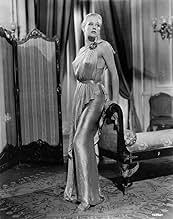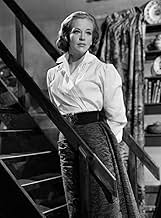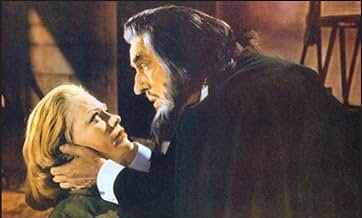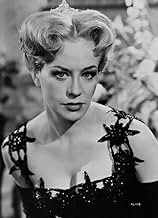Adicionar um enredo no seu idiomaThe story of a genius who hypnotizes an artist's model into becoming a great concert singer, and how she escapes from his influence only by his death.The story of a genius who hypnotizes an artist's model into becoming a great concert singer, and how she escapes from his influence only by his death.The story of a genius who hypnotizes an artist's model into becoming a great concert singer, and how she escapes from his influence only by his death.
- Direção
- Roteiristas
- Artistas
- Indicado para 1 prêmio BAFTA
- 1 indicação no total
Hildegard Knef
- Trilby
- (as Hildegarde Neff)
- Direção
- Roteiristas
- Elenco e equipe completos
- Produção, bilheteria e muito mais no IMDbPro
Avaliações em destaque
SVENGALI is a British-made version of the classic story about the evil hypnotist who creates a famous singer out of a young and untalented girl. In essence this tale is Rasputin in the music world, and it's quite a fun and eventful storyline.
The main reason to enjoy this film is the performance of Donald Wolfit (BLOOD OF THE VAMPIRE) in the title role. He seems to be channelling Bela Lugosi in both look and voice throughout the movie, and his hammy style of acting is a lot of fun; the other actors in the production feel flat by comparison.
The film as a whole isn't perfect - there's a little too much sappy romance going on, and events are never as exciting or dramatic as the producers would hope for - but the lush colours and costumes of the mid 1950s give this the look and feel of an early Hammer Horror outing. Hildegard Knef (later of Hammer's THE LOST CONTINENT) is fine as the youthful protégé, and it's fun to see Terence Morgan (CURSE OF THE MUMMY'S TOMB) before he got typecast as the bad guy.
The main reason to enjoy this film is the performance of Donald Wolfit (BLOOD OF THE VAMPIRE) in the title role. He seems to be channelling Bela Lugosi in both look and voice throughout the movie, and his hammy style of acting is a lot of fun; the other actors in the production feel flat by comparison.
The film as a whole isn't perfect - there's a little too much sappy romance going on, and events are never as exciting or dramatic as the producers would hope for - but the lush colours and costumes of the mid 1950s give this the look and feel of an early Hammer Horror outing. Hildegard Knef (later of Hammer's THE LOST CONTINENT) is fine as the youthful protégé, and it's fun to see Terence Morgan (CURSE OF THE MUMMY'S TOMB) before he got typecast as the bad guy.
Several masterpieces have been transformed because the female lead became pregnant. A less select band emerged quite differently because the director or one of the actors fell off the wagon while the film was being made (Derek Bond, who here plays The Laird, was himself himself summoned a few years later to replace Dennis Price when he showed up legless at the start of shooting 'Wonderful Life'). Robert Newton's replacement in the title role by Donald Wolfit probably made the film duller, but Wolfit was far scarier than the charming old soak would have been.
Since Frederick Pusey's sets were based on the wise decision to base the look of the film on the original engravings (which accounts for all the authentically Victorian whiskers worn by most of the men and the false nose worn by Wolfit) it's a handsome film. Even more handsome is Hildegarde Neff (as she then was) as Trilby; who sportingly sang badly until transformed both by Svengali and the substitution of Elizabeth Schwarzkopf's voice on the soundtrack.
But just as she was too human to be convincing a couple of years earlier in the title role of 'Alraune' (in which she was created by Erich von Stroheim, no less), big strapping Knef is too robust to make a convincing Trilby.
Since Frederick Pusey's sets were based on the wise decision to base the look of the film on the original engravings (which accounts for all the authentically Victorian whiskers worn by most of the men and the false nose worn by Wolfit) it's a handsome film. Even more handsome is Hildegarde Neff (as she then was) as Trilby; who sportingly sang badly until transformed both by Svengali and the substitution of Elizabeth Schwarzkopf's voice on the soundtrack.
But just as she was too human to be convincing a couple of years earlier in the title role of 'Alraune' (in which she was created by Erich von Stroheim, no less), big strapping Knef is too robust to make a convincing Trilby.
One of several big screen adaptations of du Maurier's TRILBY, this was notable for utilising the author's original illustrations in costume, and to some extent, settings. It also had the benefit of a characteristically flamboyant and forceful performance from the great Donald Wolfit. He's able to engender a small degree of sympathy for the grubby and boorish Svengali (including his frustration, as a classical musician, with Trilby's continual rendering of a rather wan little ditty, 'Alice, Where Art Though?' later to form the aptly dowdy signature tune to OPEN ALL HOURS). He's compelling whenever the film focuses on him, despite more than a touch of Frankie Howerd in places. Unfortunately it concentrates rather too much in the early stages on the ageing English art students, and not helped by some crude editing, the story doesn't grip as it should. Hildegarde Neff brings beauty, intelligence and a sense of vulnerability to Trilby, but she comes over as about as Irish as Elisabeth Schwarzkopf, whose sublime lyric soprano tones are heard on the soundtrack. Terence Morgan can make little impact as Billy, and despite being good to look at, with the colour and atmosphere of the early Hammer horrors, the whole enterprise is lacking in drive, with too many short scenes on cramped sets. The finale at Covent Garden where Svengali dramatically relinquishes his hold on Trilby is especially disappointingly handled, with the director failing to build any tension or sense of occasion, then allowing what remains to fall flat.
One of those films that has its moments, but falls firmly into the 'could have been so much better' category.
One of those films that has its moments, but falls firmly into the 'could have been so much better' category.
A better example of over-acting you will struggle to find in this overly theatrical adaptation of George Du Maurier's 1894 novel "Trilby". Hildegard Knef is a young, impressionable, girl who falls under the spell of the almost Rasputin-esque Donald Wolfit in the title role. He hypnotises her to rid her of pesky headaches, and give her the voice of an angel - and soon she becomes an international star of the opera. Robert Newton was originally slated for the lead, but I can't imagine he could have done better than Wolfit, who has the maniacal look (eyes, especially) and pithy dialogue down to a T. The support from Terence Morgan - as her much younger beau "Billee Bagot", Paul Rogers, David Kossoff and the truly wonderful singing of Elisabeth Schwarzkopf keep this entertaining enough, but the staging and style are just to limiting to let this version of a really menacing and evocative story soar.
This is quite an unusual film in that certain scenes don't make a lot of sense - storylines are clumsily and swiftly manifested with no real development and thus there is no real tension when there needs to be, however, it is visually interesting and at times beautifully lit and shot with great and believable sets.
I'm not sure if the script or the editing is at fault but think that it's some of both in equal measure that leaves the viewer at times thinking "Why was that just said?" or "Why did that character just behave like that?" or "How much time has passed between the last scene and this scene?" or "Ok, so this now appears to be the main thread of the story, why was it so long in being made apparent and why was it developed so clumsily" etc. These questions arising really put in my mind the appalling (but awfully good fun) script, and (lack of) continuity of Tommy Wiseau's "The Room".
Apart from it's script and editing/continuity reminding me of "The Room" and the storyline being reminiscient of "The Red Shoes" - possessive control-freak older man, seeks to control young woman performing against the will of her lover, - "Svengali" also reminds me of another unusual film set in Paris and made in the 1950s called "Man On The Eiffel Tower". This film is also visually interesting and nicely art-directed but also suffers from (at times) an unintelligable script and very poor continuity.
The intention of "Svengali" is of course good but poor execution of basic story-telling damages the impact of the film substantially - but I still quite liked it!
Look out for the very young and beautiful, (uncredited - even though he has some lines), great Jeremy Brett in his first feature.
I'm not sure if the script or the editing is at fault but think that it's some of both in equal measure that leaves the viewer at times thinking "Why was that just said?" or "Why did that character just behave like that?" or "How much time has passed between the last scene and this scene?" or "Ok, so this now appears to be the main thread of the story, why was it so long in being made apparent and why was it developed so clumsily" etc. These questions arising really put in my mind the appalling (but awfully good fun) script, and (lack of) continuity of Tommy Wiseau's "The Room".
Apart from it's script and editing/continuity reminding me of "The Room" and the storyline being reminiscient of "The Red Shoes" - possessive control-freak older man, seeks to control young woman performing against the will of her lover, - "Svengali" also reminds me of another unusual film set in Paris and made in the 1950s called "Man On The Eiffel Tower". This film is also visually interesting and nicely art-directed but also suffers from (at times) an unintelligable script and very poor continuity.
The intention of "Svengali" is of course good but poor execution of basic story-telling damages the impact of the film substantially - but I still quite liked it!
Look out for the very young and beautiful, (uncredited - even though he has some lines), great Jeremy Brett in his first feature.
Você sabia?
- CuriosidadesHildegard Knef's singing was dubbed by Elisabeth Schwarzkopf.
- Citações
Svengali: If you choose you can put all that nonsense behind you forever.
Trilby O'Farrall: And do what, starve?
Svengali: Not if you put your trust in me absolutely, not if you do exactly what I tell you to do.
- Cenas durante ou pós-créditosOpening credits prologue: Paris The Latin Quarter at the turn of the Century
Principais escolhas
Faça login para avaliar e ver a lista de recomendações personalizadas
Detalhes
- Data de lançamento
- País de origem
- Idioma
- Também conhecido como
- Sihirbazın İntikamı
- Locações de filme
- Nettlefold Studios, Walton-on-Thames, Surrey, Inglaterra, Reino Unido(studio: filmed at)
- Empresa de produção
- Consulte mais créditos da empresa na IMDbPro
- Tempo de duração
- 1 h 22 min(82 min)
- Cor
- Proporção
- 1.37 : 1
Contribua para esta página
Sugerir uma alteração ou adicionar conteúdo ausente























